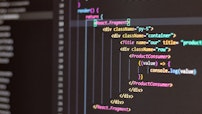How to Code: A Beginner’s Guide
- What Is Coding?
- Key Coding Terminology
empty
empty
empty
empty
empty
empty
empty
empty
empty
- What Are Programming Languages?
- Types of Programming Languages
empty
empty
empty
empty
empty
- What Is Coding Used For?
- Coding Job Titles
empty
empty
empty
empty
empty
empty
empty
empty
empty
- Why Is It a Good Idea to Learn to Code?
empty
empty
empty
empty
empty
empty
- How to Start Learning to Code
- Final Thoughts
What Is Coding?
'Code' is a term for the programming language that tells a computer what to do and 'coding' is writing it.
Computers do not understand English (or any other human language), and coders create a translation between human-understandable and computer-understandable instructions.
Every computer, smart phone, laptop or connected device works using a programming language that has been coded to make it operate in the correct way.
While programming and coding are defined as separate skills – a coder creates a script that the computer can understand, while a programmer puts the code together to make a program run – in practice they are interchangeable:
to make the computer work in the correct way, a coder or programmer needs to create the instructions for the computer’s actions through code in a script.
An important facet of the script that is used is syntax.
As in human language, the syntax of the script includes the rules of structure and form rather than any logical meaning. Think of syntax like grammar – words go in a specific order because those are the structural rules, not because it is logical.
The syntax is incredibly important in programming languages – the wrong syntax would make the entire script unusable.
Key Coding Terminology
Programming language, like any other language, comes with unfamiliar terms that need to be understood:
Hardware
Hardware refers to the physical components of a computer, from the screen, keyboard and mouse to the internal parts like the graphics card and the CPU (Central Processing Unit).
Software
Software is a term for the collection of instructions and data that tells the computer how to work and complete the activity that is needed.
The programs you run on your computer or phone are software.
Binary Numbers
Binary numbers are an essential part of the way computers read and interpret information.
Computers can only count to 1. A series of 1’s and 0’s that are known as ‘bits’ make up the binary number system.
Scripts
A script is a series of steps that are written for a computer to follow.
The computer processes the script from top to bottom, reading and executing each statement in order.
Statement
A coding statement is a series of words, numbers and punctuation that is put together to tell a computer to perform an action.
Scripts are made of multiple statements.
Algorithm
An algorithm is a set of instructions that the computer follows in order to solve a problem (such as which posts to display at the top of your social media feed) – it is essentially the thought process of the computer.
Argument
When creating a code, the function of the code can be amended using an argument that provides more information (such as a variable).
Variable
Often a single word or number used throughout the code. It can be a string (a word or a phrase), a single character, or even a representation of true and false (these are called Boolean).
Source Code
Source codes are essentially snippets of statements that have a specific purpose.
These can then be assembled into a computer program that performs executable actions.
What Are Programming Languages?
There are possibly thousands of human languages, and there may be just as many programming languages.
Many have been designed for a specific use – that is, proprietary languages that are created for a particular purpose.
However, there are quite a few programming languages that are widespread and most of them are simple for beginners to learn. These programming languages can be used to make the front and back-end of websites, apps, games and other computer programs.
Types of Programming Languages
Here are just a few of the many programmung languages out there:
HTML
HTML (Hypertext Markup Language) is possibly the most widespread coding language and is heavily featured in front-end internet development.
It is a popular choice for beginner coders because the language is simple to learn, and the syntax is straightforward – and it can be used to create websites without too much in-depth knowledge.
CSS
CSS (Cascading Style Sheets) is another language used for front-end development and is often learned in conjunction with HTML as they work well together for the style and design of the finished product.
It is reasonably simple to learn and makes the most sense when used with HTML.
Java
Java is a very versatile coding language, used throughout back-end web development and also in mobile app creation.
Although it is quite simplistic, it is favoured by developers because it is easy to learn and use, thanks to the syntax (which is similar to English).
It is also scalable, which means that the scripts can grow with the programming needs.
Python
Python has become a well-known coding language because it is everywhere.
It is versatile enough to use for all programming applications and is now the most common coding language taught in schools (and through online learning portals), with many software and programming roles demanding a solid grasp of Python.
JavaScript
Despite the similar names, Javascript is not the same as Java.
JavaScript is the coding language that is used in front-end website development to create more interactive interfaces like videos, animations and even GIFs.
JavaScript can also be used in back-end development and is one of the fastest growing coding languages.
What Is Coding Used For?
Coding can be fun – and it is always good to have a challenge.
Further, learning coding could be a valuable upgrade to your skill set that could lead to a lucrative new career.
Many people have basic ICT skills but fewer people can code.
Working with code could offer job security, a pay rise, better work/life balance and a number of (sometimes surprising) roles both in and out of the IT and tech industry.
Read on to find out about some of them.
With 6+ years of experience, a coder or developer earns an average salary of £45k plus in the UK.
Coding Job Titles
Junior/Senior Developers
Developers write scripts, work with databases, create complex applications and complete user analysis.
Mobile App Developers
The fast-growing market for mobile app development, covering everything from high-end games to receipt trackers, means that coders who can produce interesting and useful applications for iPhone and Android are always in high demand.
Programmer
Taking the plans of developers and combining them with the creativity of the designers is where programmers and coders shine.
Creating a useable code and programs that execute exactly the processes needed takes extensive knowledge.
Data Engineer
Coding can be used to produce data that is necessary for businesses to succeed.
Data engineers build, maintain and test solutions as well as create large-scale processing systems.
Data Scientist
Taking the data created and parsed by data engineers, data scientists analyse information to uncover important insights that are useful to the success of a business.

Designer
Design that uses digital tools is the modern answer to pencil and paper, and knowledge of coding can make the manipulation of designs simple.
Designers are important for everything from website layout to logo creation, video production and game design.
User Experience (UX)
UX designers are an essential part of online and offline businesses – and coding knowledge and experience can help those involved make sure the users experience the absolute best of the business.
Start-Ups
Entrepreneurs and start-up businesses often have limited budgets but lofty ideas – and if you want to be involved in an exciting new business, having knowledge of code makes you a valuable commodity – even more if it is your business idea because then you will not need to hire someone.
Freelance Coder
Being self-employed and running your own business can be difficult – but if you have the skills to build websites, design e-commerce sites and design your own marketing and branding, you can be your own tech guru, saving time and money.
Plus, other people often want to hire someone with such skills on a short-term basis, which works well for freelancers.
Why Is It a Good Idea to Learn to Code?
Learning to code has so many benefits – aside from the obvious one of developing a new skill set, of course.
Increased Income (Often for Fewer Hours)
Having the coding skills that lead to a new role could mean better pay without stretching yourself in terms of hours.
Being a great programmer or coder could lead to roles in tech firms, start-ups and elsewhere – with the added bonus that you can effectively choose your hours and your pay from the ranges on offer.
Job Security
Technological development is not slowing down. Everything from virtual reality and artificial intelligence to the increasing prevalence of mobile technology relies on coding, so this is an area of continuing growth.
Coding is a valuable skill and, alongside lifetime learning, it is always going to be in demand – competent coders will have increased job security for the future or beyond.
Become More Employable – Even Outside of Coding
Having skills over and above those required for a job role can make you stand out when job hunting.
For recruiters, you would stand out over and above all the other candidates if you can offer coding skills.
You Can Develop Your Own Programs or Work for Yourself
Becoming skilled in coding means you can start developing your own programs and work for yourself, building up your own ideas and projects and not solely other people’s.
Whether you choose to work on open-source code or create something new and amazing, there are several options that you can take to work for yourself with your newfound coding skills.
Industry of Continuous Learning
Every day in the coding world, you are learning – the whole industry is about developing.
Whether it is programming languages, working in artificial intelligence (AI) or in a brand-new area, learning coding is a journey that does not end after a simple course.
More Free Time and a Better Work/Life Balance
Being able to choose your hours, whether as an employee with a lot of offers to pick from or through freelance work, helps you gain a better balance between working and free time.
Investing the necessary time now to learn the skills that you need for the future could see you working less.
Coders and programmers can often work from home, meaning that the time they would have spent commuting can now be spent relaxing.
How to Start Learning to Code
You can learn to code through various means – you can start on your own, learn from others or take official courses.
Whichever way you choose to learn, there are many resources available that can help.
Here are some steps to get you started and help you choose which method is right for you:
Step 1. Establish What You Want to Use Your Code Skills For
Before you start learning, understand what it is that you want to learn – and why you want to learn it.
Design your goals around the SMART mnemonic:
- Specific
- Measurable
- Achievable
- Realistic
- Time-bound
Having a goal to work towards makes it easier for you to focus on your learning and stay motivated by seeing the progress you are making.
Step 2. Pick a Programming Language to Start Learning
With so many coding languages available, choosing where to focus your learning can seem more intimidating than the actual learning itself.
Remember: Just because you choose one language now does not mean that you have to only study that one forever. Once you have learned one language it is often somewhat easier to understand others too.
Python is a very popular language, as mentioned above; JavaScript is another one people often begin with.
Step 3. Start Small
Teaching yourself is entirely possible thanks to the huge amount of information that is available online and in books.
Starting small means that you can give yourself basic knowledge to work from.
Learning small amounts from resources like YouTube or other video tutorials is a great option – they offer often high-level overviews that teach enough for you to be able to competently complete basic coding exercises.
Many websites that teach coding use coding exercises where you can implement what you have just learned in a semi-structured environment to see if you understand it.
Step 4. Invest in Your First Coding Book
It might seem strange to use offline sources when you are learning something that is so strongly focused on computers and online.
But, while the specific of coding languages change, the theory behind them does not.
Therefore, investing in a coding book allows you access to expert knowledge in a way you can refer back to again and again and that may be more vetted than a random website.
There are a good few programming books available, and they remain as relevant now as when they were published.
Consider The Art of Computer Programming by Donald Knuth as a potential starting point.
Step 5. Enrol on a Course
Whatever coding language you are looking to learn, there are several courses online and even at colleges that will be able to give you the information you need.
When considering which course to enrol in, start by establishing how much time and money you want to invest.
Courses range in time commitment as much as they do in costs, so deciding what you want to spend on this aspect is a completely individual proposition. This will help narrow down the right courses for you.
Also, do not dismiss free courses out of hand – there is real value in them, especially for beginners and those wanting to try coding out before committing to something longer term.
Step 6. Join a Coding Community
The benefit of learning something like coding is that you can share what you produce and receive advice, support and feedback from others.
There are coding groups on sites like Reddit and GitHub – look around, as finding like-minded learners on the same path as you can give you a sense of community.
These groups offer a chance to share code, ask for feedback and develop best practice so that you can learn effectively.
Step 7. Get a Code Editor
When you are learning, especially through an online course, there is likely to be a code editor built into the browser that you use to complete exercises as you go.
Once you complete that course, however, you need to download one for yourself.
Having a code editor to hand that you can use as you learn, based on the programming language you are looking to learn, is the best way to get used to how the code editing software works.
You can easily find the relevant code editor for your chosen language online.
For example, Notepad++ is a free piece of software that, while similar to basic notepad software, highlights the syntax of different coding languages.
However, you may need another program to run your code in as Notepad++ does not have an IDE.
As part of the download of many code editors, you are likely to get an Integrated Development Environment (IDE) that will help you build your code. More simple languages can be written straight into a text document (like HTML or CSS).
The IDE and the editor will help you create your code and test it to make sure it works.
Step 8. Start Writing Your Own Programs
There is no better way to try out your skills as you learn to start coding than writing your own programs.
Imagine that satisfaction from seeing something develop from a nebulous idea to functioning software because you were the one to code it.
Plus, implementing what you have learned in a full self-directed way is an excellent method for cementing it in your mind.
It is probably better to work on smaller projects that are simple in scope, as it will be easier to understand what has happened when something does not work and they will be quicker to make than something more complex.
The language you are learning will inform the projects that you can choose.
A few ideas that you might want to consider include:
-
Create a simple website – Perhaps a personal one-page bio or a portfolio, or maybe even for a business. Consider this for HTML or CSS.
-
Create a web application like a calculator, a game or a quiz. This could be good for Javascript.
-
Code a content management system (CMS; think WordPress). Try LaTex for this.
-
Design a mobile app for iPhone and/or Android. Since 2008, Java has been the default language for coding Android apps.
-
Contribute to an open-source project (great for feedback on coding). These exist for all coding languages – try searching by the coding language you are learning for open-source projects on somewhere like GitHub.
-
Design and make an e-Commerce store. This is one to test your Python skills with.
Step 9. Unpack Someone Else's Code
When you have some experience in understanding what you are looking at in terms of statements and strings, you should check out other people’s codes, perhaps from your favourite (simple) program.
This is another good reason to join a coding community, as there will often be people who upload their code for people to look at and play with.
Unpacking the language used, the way the syntax was chosen and checking that you understand all the functions using your editor is a good test of what you have learned.
If you can edit the code to improve it, then that is an excellent project in itself and you can share it with your coding community to get feedback.
Step 10. Reverse Engineer a Website
As an extension of unpacking someone else’s code, reverse engineer a website by trying to clone it.
Although you can learn a lot from tutorials and courses, for many coders the real learning comes from doing, from putting the time in.
And there is no better way than to complete an entire build.
Watch for special techniques and parts of code that could offer something new for you to learn used in the website you are cloning – this is a great time to add new snippets of information from different programming languages too.
Step 11. Try Coding Games
A fun way to practice coding is to play games and there are a number of options available online.
Often, these are puzzle-type games where the answers must be found through coding.
For example, CodeCombat, while aimed at young people, has interesting and challenging game options that develop your coding skills organically and is enjoyed by many.
Final Thoughts
Coding can be learned on your own through various online resources like YouTube and books – but if you prefer to follow a structured plan for your learning then there are many courses available online that will help, both free and paid.
Reskilling or upskilling in the tech industry, especially in a new coding language, could offer more salary, better hours or the opportunity to freelance – as well as job security due to the skill’s desirability.
All your practice can be consolidated in many ways, from writing your own projects through dissecting someone else’s code to playing games.
Learning to code could be a pathway to a new career or be another feather in your cap that makes you even more employable.





